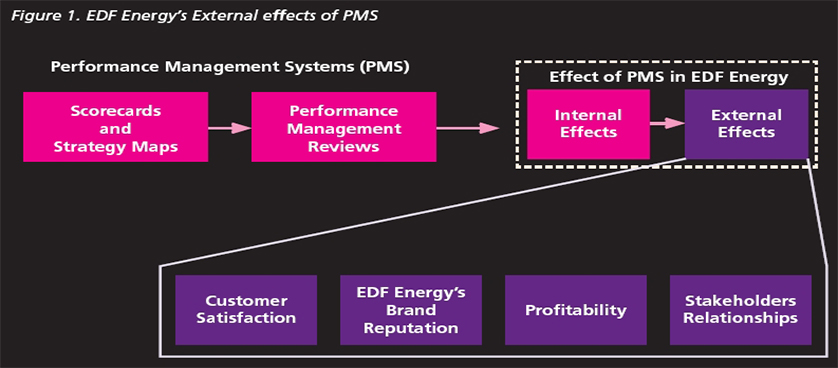The impact of Performance Measurement Systems on business performance
One of the most debated and controversial topics about Performance Measurement Systems (PMS) is the impact the PMS implementation and usage have upon the business performance, in terms of clear, tangible results. Martinez, Kennerley & Neely (2004, p. 1) stated that the little body of research on this topic, as reported mainly by consultancies and commercial research companies, has two limitations.
- the lack of a strong methodological basis;
- a quantitative approach with little explanation regarding results.
To research papers on the topic have approached the issue differently, through a structured qualitative methodology: Impact of PMS on business performance: a methodological approach (Martinez, Kennerley & Neely, 2004) and Impact of Performance Measurement and Management Systems (Martinez et al., 2010).
The first research paper presents a synthesis of the studies conducted on this topic and their main conclusions:
- Organizations making more extensive use of financial and non-financial measures and linking strategic measures to operational measures have higher stock market returns. While only 23% of 157 organizations surveyed consistently build and test causal models, these 23% achieved on average 2.95% higher return on assets and 5.14% higher return on equity (Ittner, Larcker & Randall, 2003; Lingle & Schiemann, 1996);
- The use of PMS as a management control tool reduces the overhead costs by 25% and increases sales and profits (Lawson, Stratton & Hatch, 2003);
- The positive impact of PMS also involves other type of benefits, such as:
- development of managerial capabilities (Weinstein & Castellano, 2004),
- effective communication (Malina & Selto, 2001),
- improvement of reputation and leadership (Anderson et al., 1994),
- improvement of customer satisfaction (Davis et al., 2004),
- the improvement of sales and market expansion (Evans, 2004; Larcker, 2004),
- increase income per employee (Gubman, 1998),
- staff motivation enhancement (Godener & Soderquist, 2004),
- top management commitment improvement (Cavalluzo & Ittner, 2004)
- The use of highly balanced PMS facilitates well-balanced decision-making and better decisions ultimately impact business results (Frigo & Krumwiede, 1999; de Waal, 2003; Sandt et al., 2001);
- Using PMS and linking scorecard systems to compensations and rewards significantly increases employee satisfaction (Lawson, Stratton & Hatch, 2003; Dumond, 1994);
- Organisations updating the strategic scorecard regularly and formally tying strategy to responsibilities increase the support in changes business strategies (Lingle & Schiemann, 1996; Lawson, Stratton & Hatch, 2003);
- The identification and selection of appropriate measures and key performance indicators enhances the implementation and acceptance of the business strategy, and at the same time enhances employee understanding of the company business (Ketelhohn, 1998; Vasconcellos, 1988).
The second research paper mentioned above: Impact of Performance Measurement and Management Systems (Martinez et al., 2010), is based both on a quantitative research methodology – a survey study in UK manufacturing and service sectors carried out in 2006 and a thoroughly analyzed case study based on eight months of research in EDF Energy’s Networks Branch carried out by Cranfield’s Centre for Business Performance during 2004 – 2005.
The survey study highlights that:
- 69% of manufacturing companies and 62% of services companies agree that Performance Measurement Systems improve people focus;
- 58% of manufacturers suggest that PMS improve the operation’s feedback, in contrast to 49% of services.
- 68% of manufacturers agree that PMS enhance the communications skills ;
- 49% of services and 45% of manufacturers suggest that PMS help them to stimulate debates around performance;
- 62% of manufacturers and 48% of service providers agree that somehow PMS contributes to the employee’s satisfaction;
- 52% of manufacturers and 41 % of services agree that PMS increases managers’ motivation;
- 72% of manufacturers suggest that PMS encourage employees’ participation in the discussions around performance improvement; whereas 58% of services report that PMS support them the most on sharing best practices.
- 53% of manufacturers and 50% of services report that PMS support the productivity level. Similar figures are reported on the PMS effects on operational improvements. However, only 39% of manufacturers and 29% of services agree that PMS affects their employees’ performance.
- A common agreement among manufacturers and services is that PMS improve the customers’ relationships, customers’ satisfaction and customers’ retention. Nevertheless, only services report that PMS supports them on building stronger relationships with other stakeholders, such as suppliers and regulators.
- 63% of manufacturers agree that PMS supports the sales growth as opposed to 41 % of services (Martinez et al., 2010).
The EDF Energy case study also describes the factors that contributed most to the PMS’s successful implementation and the aspects which, at least initially, tended to hold it back from achieving its full potential. The report highlights the vital importance of performance reviews at both executive and operational levels, providing guidelines for EDF Energy in order to adjust to the ongoing development of the PMS.
Measuring the tangible impact of Performance Measurement Systems on business performance is a difficult task, this topic remaining actual and of real interest not only for researchers, but also for executive managers. A key factor in deciding if to implement a PMS is the forecast ROI (Return On Investment). The ability to predict the impact of PMS on business results is crucial to get the buy-in from the executive or board team members, while the effects of performance management systems need to be better understood in order to maximize their benefits.
References
- Anderson, E., W., Fornell, C. & Lehmann, D., R. (1994), Customer satisfaction, market share and profitability: findings from Sweden, Journal of Marketing, Vol. 58, No. 3, pp. 53-64.
- Cavalluzzo, K., S. & Ittner, Ch., D. (2004), Implementing performance measurement innovations: evidence from government, Accounting, Organizations and Society, Vol. 29, pp. 243-267.
- Davis, S. & Albright, T. (2004), An investigation of the effect of Balanced Scorecard implementation on financial performance, Management Accounting Research, Vol. 15, pp. 135-153.
- Evans, J., R. (2004), An exploratory study of performance measurement systems and relationships with performance results, Journal of Operations Management, Vol. 22, pp. 219-232.
- Godener, A. & Soderquist, K., E. (2004), Use and impact of performance measurement results in R&D and NPD: an exploratory study, R & D Management, Vol. 34, No. 2, pp. 191-219.
- Gubman, E., L. (1998), The talent solution aligning strategy and people to achieve extraordinary results, McGraw-Hill, New York, NY.
- Malina, M. & Selto, F., H. (2001), Communicating and controlling strategy: an empirical study of the effectiveness of the balanced scorecard, Journal of Management Accounting Research, Vol. 13, pp. 47-90.
- Martinez, V., Kennerley, M. & Neely, A. (2004), Impact of PMS on business performance: a methodological approach, Centre for Business Performance, Cranfield.
- Martinez et al. (2010), Impact of Performance Measurement and Management Systems, Journal of the Institute of Management Service, Vol. 54, No. 3, pp. 8-14.
- Weinstein, L., B. & Castellano, J., F. (2004), Scorecard support, CMA Management, pp. 18-23.

Tags: Andy Neely, Organizational Performance, Performance Measurement, Veronica Martinez





